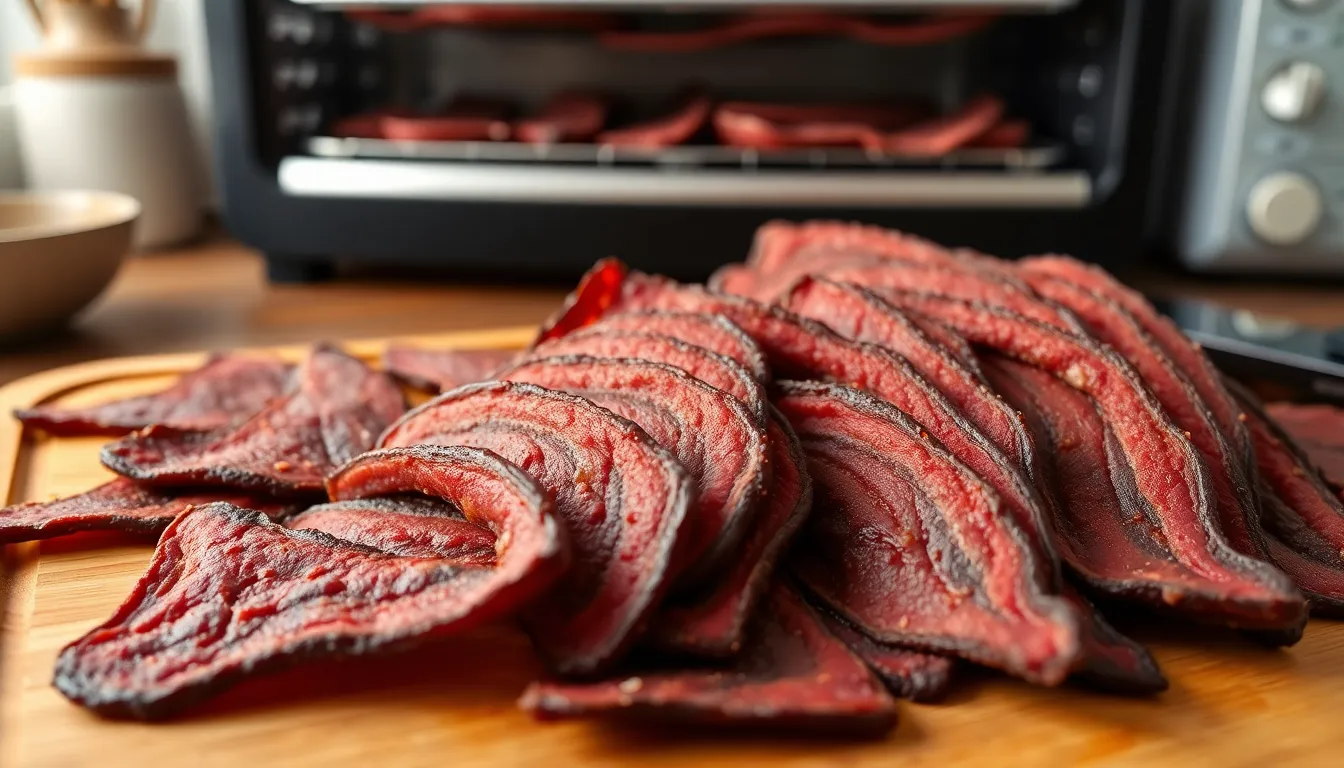Table of Contents
ToggleBeef jerky is a beloved snack, known for its rich flavor and satisfying chew. But for those venturing into the world of homemade jerky, timing is everything. Dehydrating beef jerky requires precision and patience to achieve that perfect texture and taste.
Understanding how long to dehydrate beef jerky can make all the difference between a chewy delight and a tough, inedible mess. Factors like meat thickness, dehydrator settings, and humidity levels play crucial roles in the drying process. This guide will explore the optimal drying times and tips to ensure a delicious batch of jerky every time. Whether you’re a seasoned pro or a first-time maker, mastering the dehydration process will elevate your jerky game.
Understanding Beef Jerky Dehydration
Dehydrating beef jerky involves precise methods to ensure optimal texture and safety. Several factors play a role in determining the duration needed for effective dehydration.
The Science Behind Dehydrating Meat
Dehydrating meat removes moisture, creating an inhospitable environment for bacteria, mold, and spoilage. The process involves heat and airflow to evaporate water from the meat’s surface. Proper dehydration requires achieving a consistent temperature, typically ranging from 145°F to 160°F, to eliminate pathogens while maintaining flavor and texture. Meat thickness affects drying time; thinner slices dehydrate more quickly than thicker cuts.
Importance of Dehydration Time
Dehydration time directly influences the jerky’s final product quality. Under-dehydration can result in a soft, perishable product, while over-dehydration makes jerky tough and chewy. The target drying time often varies between 4 to 12 hours based on meat thickness, dehydrator efficiency, and environmental humidity levels. Regularly checking the jerky’s texture helps ensure optimal results; properly dried jerky should crack slightly when bent but not break.
Factors Influencing Dehydration Time

Drying beef jerky depends on various factors, including slice thickness and environmental conditions. Understanding these elements helps achieve the desired jerky texture and flavor.
Thickness of the Meat Slices
Thickness significantly affects dehydration time. Thicker slices, generally over 1/4 inch, require longer drying periods, typically between 8 to 12 hours. Thinner slices, under 1/4 inch, dehydrate faster, often completing the process in 4 to 6 hours. Ensuring uniform thickness promotes even drying, preventing some pieces from being over- or under-dehydrated.
Humidity and Temperature Conditions
Humidity and temperature levels also play crucial roles. Higher humidity slows moisture evaporation, extending dehydration time by 1 to 2 hours. Lower humidity accelerates the process.
Temperature consistency, within the range of 145°F to 160°F, maintains effective drying. Deviating from this range may lead to inadequate drying or spoilage. Monitoring the environment ensures optimal conditions for the best jerky quality.
Recommended Dehydration Times
Dehydration times for beef jerky vary based on several factors. Understanding the method used and the specific cut of beef aids in determining the ideal duration for producing quality jerky.
Traditional Methods vs. Dehydrators
Traditional methods can take longer than using dehydrators. Air drying or using an oven typically requires 8 to 12 hours for beef jerky. Temperature control leads to potential inconsistencies in drying time with these methods. In contrast, dehydrators offer precise temperature settings between 145°F and 160°F. Dehydrators generally produce jerky in 4 to 10 hours, allowing for better moisture removal in less time.
Guidelines for Different Cuts of Beef
Different cuts of beef influence dehydration times significantly.
- Eye Round: Slices, 1/4 inch thick, dehydrate in 4 to 6 hours.
- Top Round: Slices should require 5 to 7 hours when cut similarly.
- Bottom Round: Thicker cuts, over 1/4 inch, observe dehydration times extending up to 12 hours.
- Brisket: Slices, 1/4 inch thick, generally dehydrate in 6 to 8 hours.
Thicker slices necessitate extended drying periods, ensuring moisture elimination while maintaining flavor and texture. Regular texture checks during dehydration help achieve consistent results.
Tips for Perfectly Dehydrated Beef Jerky
Perfect beef jerky requires attention to detail. Following specific tips can enhance flavor and texture.
Choosing the Right Marinade
Choosing the right marinade influences flavor significantly. A balanced mixture of soy sauce, Worcestershire sauce, vinegar, garlic powder, and black pepper creates a robust taste. Utilizing acidic ingredients, such as citrus juice or vinegar, helps tenderize meat while enhancing flavor. Allowing the beef to marinate for at least 4 hours ensures deeper absorption of flavor. For best results, marinate for 12 to 24 hours. Experimenting with spices, such as chili powder or smoked paprika, adds unique flavor profiles tailored to personal preferences.
Proper Storage Techniques
Proper storage extends jerky shelf life and maintains quality. Storing dehydrated jerky in airtight containers or vacuum-sealed bags preserves freshness. Labels with drying dates help track shelf life; properly stored jerky lasts 1 to 2 months at room temperature and up to 6 months in the refrigerator. Keeping jerky in a cool, dark place prevents spoilage. Vacuum sealing reduces air exposure, which slows down oxidation. Freezing jerky can further prolong its shelf life, ensuring optimal taste and texture when you’re ready to enjoy it.
Perfecting the art of beef jerky requires attention to detail and an understanding of the dehydration process. By considering factors like meat thickness and environmental conditions, anyone can achieve the ideal texture and flavor. Regularly checking the jerky’s consistency ensures it’s neither under nor over-dehydrated.
With the right techniques and patience, homemade beef jerky can be a delicious and satisfying snack. Proper storage methods will keep it fresh for months, allowing for enjoyment long after the initial batch is made. Whether for personal use or sharing with friends, mastering jerky making is a rewarding endeavor.






